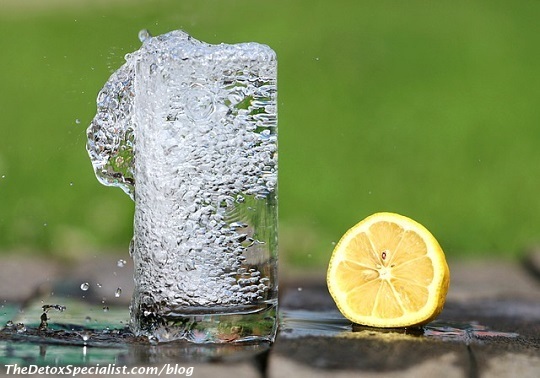
An average-weight person can generally survive six weeks without food (although Irish Republican prisoner Bobby Sands lived 66 days before dying during a hunger strike); but going without water is a different story.
Following individuals at the end of life, Randall Packer, a professor of Biology at George Washington University, observed that death usually occurred three to four days after stopping water, and that the longest observed survival without water was about a week.
How can water be more vital to our survival than food? The answer lies in the body’s make-up: the human body is approximately 60 percent water. And that water is needed to perform vital protective, regulatory, and preventative functions:
1. Water protects the body’s tissues, spinal cord, and joints.
Without water, the body’s tissues dry out, the spinal cord loses valuable fluids from the discs between the vertebrae, and the joints lose the fluids which surround them.
Two indications that tissues aren’t properly properly hydrated include, 1) the skin appears dry and wrinkled; 2) the eyes feel dry, and vision may be blurry. Luckily, drinking water and replacing lost electrolytes can rehydrate tissues fairly quickly.
Related reading: Detox Waters for Everyday Drinking
Without water, the spinal cord is in danger of dry compressions. Every time the body moves, the discs in the spinal cord are compressed. This compression causes the fluid inside the disc to squeeze out to lubricate the vertebrae. Without spinal fluids, the discs can’t refill themselves and the vertebrae remained compressed, causing pain and immobility. When dehydrated, joints throughout the body present a similar type of problem as the spine: with movement, the lubrication surrounding the joints is lost and pain ensues.
2. Water maintains the balance of body fluids, regulates bodily functions, and helps to remove toxic wastes.
With 60 percent of the body being made up of water, maintaining that balance of body fluids is imperative. When body fluids are out of balance, the body can’t properly regulate its own bodily functions, including body temperature, and it begins to shut down. One of the biggest shutdowns occurs in the kidneys where water is vital in flushing out urea nitrogen from the blood. If these toxic wastes aren’t eliminated through urine output, the toxins build up in the kidneys. Over time, this can be life-threatening.
One way to know if you’re getting enough water is to check the color, concentration, and odor of your urine: concentrated, yellow, odiferous urine signals too little fluid intake. If you discover you’re not getting enough fluids each day, make sure you up your water consumption levels. According to the Mayo Clinic, men should drink at least thirteen cups of water each day; women should drink at least nine cups of water.
3. Water aids digestion and weight loss.
Without water, our entire digestive system is impaired. Water is needed to absorb and transport the nutrients throughout the body. It is also necessary to move waste through the intestinal tract. When the body is dehydrated, constipation is common because the body must pull necessary fluids from the waste inside the colon, leaving the bowels dry and too hard to easily move. Rehydrating with water or carbonated water will help you get over your constipation.
When the digestive system is working properly, it is much easier to begin to lose weight. Food is broken down more efficiently, and nutrients are delivered to their needed systems. If exercise is part of your weight loss regimen, water is important to your weight loss success for another important reason: The majority of the water in the body’s tissues are found in the muscles (75%), and when water levels are low, individuals will generally suffer from muscle fatigue as the fluids and electrolytes get out of balance. This can be prevented by drinking 18 oz two hours before exercise to energize the muscles and boost metabolism.
4. Water prevents dehydration.
One of the main functions of water is to prevent dehydration. Dehydration is defined as a significant loss of body fluid that impairs normal bodily functions. This occurs when you lose more fluid than you take into your body. The main ways the body loses fluids are through illness (diarrhea, vomiting, fever, increased urination due to diabetes, etc.), and high temperatures and intense exercise that cause excessive sweating.
When an infant or young child becomes dehydrated, they will have a no tears when they cry, sunken eyes and cheeks, no wet diapers for at least three hours, a sunken soft spot on the skull, and lethargy or irritability; in an adult, there will be dark-colored or deep yellow urine, less frequent urination, fatigue, dizziness, extreme thirst, and mental confusion.
If not taken care of, the consequences of dehydration can be deadly–especially to the very young and the very old. When illness strikes and symptoms of dehydration appear despite your best efforts at staying hydrated, it’s imperative to seek medical attention immediately.
Sometimes dehydration is preventable through simply keeping a water bottle handy to drink water at regular intervals or through drinking extra fluids prior to activities that will cause you to sweat excessively.
Another way to prevent dehydration is to prepare for emergencies where clean water supplies may be lost or limited. The CDC suggests that when possible, individuals store enough water for each person to have one gallon a day for at least three days. Purchasing an FDA approved 50 gallon water tank can provide a gallon of water a day for a family of five for up to ten days–a perfect way to keep family members hydrated when emergencies occur.
Water is more important to our short-term survival than food because of its protective qualities toward our tissues, spine, and joints; its ability to maintain body fluids, regulate bodily functions, and remove toxins; its role in healthy digestion and weight loss; and its ability to prevent dehydration. Utilizing simple ways to stay hydrated on a daily basis, and finding ways to stay hydrated if natural disasters or other emergencies should occur is key to maintaining optimal health.
Related reading: 5 Ways Detox Water Can Help with Weight Loss
 Author Bio: Paisley Hansen is a freelance writer and expert in health, fitness, beauty, and fashion. When she isn’t writing she can usually be found reading a good book or hitting the gym.
Author Bio: Paisley Hansen is a freelance writer and expert in health, fitness, beauty, and fashion. When she isn’t writing she can usually be found reading a good book or hitting the gym.



